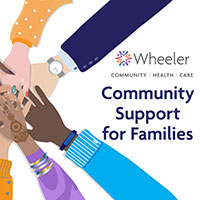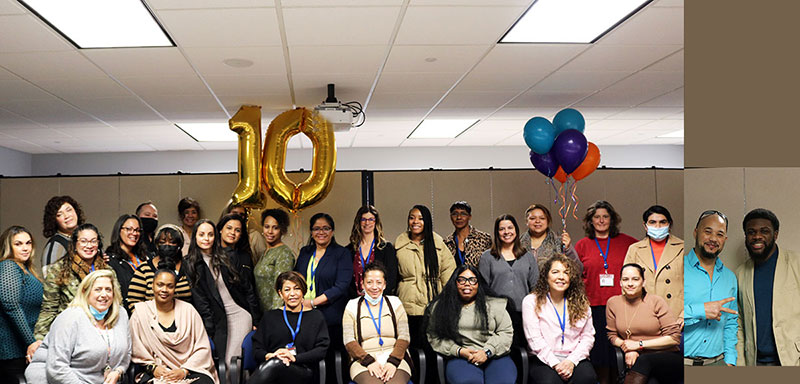Wheeler’s Community Support for Families Program Turns 13

STORY UPDATED APRIL 1, 2025.
Editor’s Note: The story below originally appeared in April 2022, in celebration of this program's 10th anniverary. The team recently marked 13 years of serving individuals and families, and the accomplishments and sense of pride remain the same.
Introduction: A child is without a coat on a cold day. She is always hungry and routinely misses important medical appointments. On the surface, her issues may present as child neglect and abuse requiring a dramatic response, but instead can be managed differently through a process called differential response (DR). Differential response establishes multiple pathways to respond to child maltreatment reports. It was implemented 13 years ago by the Connecticut Department of Children and Families as part of national child welfare reform. At that time, DCF engaged providers, including Wheeler, to employ an alternative approach to supporting families suspected of child abuse or neglect and who are at low risk.
 March 2022: Wheeler’s Community Support for Families (CSF) program marked a birthday in late March 2022, and there was a lot for this 29-member team to celebrate. Funded by the Connecticut Department of Children and Families, Community Support for Families is a voluntary, family-driven program designed to assist families in strengthening natural and community support systems to maintain safe and healthy home environments. This in-home program provides intensive support to families struggling with multiple issues such as employment, childcare, homelessness, truancy, access to medical care and/or behavioral health care, parenting support, domestic violence, and access to basic needs.
March 2022: Wheeler’s Community Support for Families (CSF) program marked a birthday in late March 2022, and there was a lot for this 29-member team to celebrate. Funded by the Connecticut Department of Children and Families, Community Support for Families is a voluntary, family-driven program designed to assist families in strengthening natural and community support systems to maintain safe and healthy home environments. This in-home program provides intensive support to families struggling with multiple issues such as employment, childcare, homelessness, truancy, access to medical care and/or behavioral health care, parenting support, domestic violence, and access to basic needs.
Wheeler’s program serves families in DCF Region 6 (New Britain/Meriden) in partnership with the Human Resources Agency of New Britain, and DCF Region 4 (Manchester and Hartford).
“We share a commitment with DCF to not approach families that may be struggling with a ‘one-size-fits-all’ approach,” said Elisabeth Cannata, PhD, vice president of community-based family services and practice innovation at Wheeler. “We work with families with diverse needs who benefit from support in difficult times. We build upon the existing strengths in the family and help parents to identify the resources that will help them to meet their children’s needs.”
How the Program Works
Wheeler’s team works with referred families over a four to six-month period to create a strengths-based, family-driven plan and establish connections with appropriate supports in the community to help the family succeed and accomplish their goals. Families also may be referred for treatment for mental health, substance abuse, family violence, and other issues for the child(ren) and/or parents.
The program helps identify each family’s unique strengths and needs, and assists in overcoming barriers to meeting those needs by:
- Establishing links to community supports and services for food, clothing, shelter, mental health and/or substance abuse treatment, and other services
- Working with families to identify and mobilize natural supports
- Providing information on parenting and child development or other interventions to increase safety for children
- Supporting parents’ connections with their child’s school community
“Among its many goals and objectives, this program strives to reduce the number of families who return to the attention of the child welfare system,” added Cannata. “And there is good news. Data shows that families who receive our services are less* likely to have a repeat substantiated report than families that do not access to the program.
“Our program has become an essential part of the Differential Response System and a reflects a true partnership with DCF to support families and keep children safe at home,” she added. “This work is incredibly meaningful and effective.”
One Decade, Many Results
Since the program’s inception, over 4,500 families have been served, and the outcomes have been strong. Last year, Wheeler’s team in Region 4 served 341 families. The engagement rate of new referrals for the year was 89%, and 86% of families discharged had met their service plan goals. In Region 6, 458 families received CSF services, with a 91% engagement rate, and 93% meeting their service plan goals by discharge. In both regions the teams served more families than contracted and had engagement and outcomes exceeding state benchmarks. Also of note, on the NCFAS (North Carolina Family Assessment Survey), a standardized measure of family functioning, comparison of families at intake and discharge show improvements in multiple domains, including parenting capabilities, child well-being, family safety, and family interactions for most families served by the program.
Beyond the impressive impact for families, what also stands out in looking at Wheeler’s 10-year history implementing CSF, is the impact it has had on staff. Seventy-six percent of the CSF staff have been with the program for five years or more, and 45 percent have worked in the program for the full 10 years. In speaking about this remarkable staff retention, Dru Breslav, LCSW, a director overseeing CSF as well as many programs in the department of Community-based Family Services, notes, “The stability of the staff in Community Support for Families is a direct reflection of the four supervisors dedication and longevity. Tanya Caamano, Kalisha Yopp, Shauna Goodwin, and Marline Cosme all give outstanding support to the staff and are there to help them through all the challenging situations and crisis that occur with in-home work. These supervisors also facilitate an excellent partnership with DCF in all four area offices which helps the program run smoothly and ensures families receive the highest quality care when they need it. DCF has been an active partner in CSF’s growth and success over the 10 years, and we appreciate all the collaboration from DCF staff that has made it possible.”
And if this doesn’t already capture what makes CSF special, click here to hear more about what staff have to say.
*Sources: Department of Children and Families and the University of Connecticut





